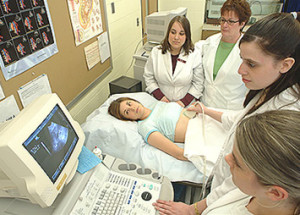Ultrasound technician college courses teach you the mastery of Sonography so that you can become a vital member of a medical team, using sophisticated imaging equipment to view inside the human body, taking real-time images of tissue, organs and blood flow. You will take classes in the various aspects of Sonography, including obstetric, abdominal, small parts and musculoskeletal. You will also put all these into practice during a number of clinical rotations. Other important classes will include patient care, physics and anatomy, all of which will teach you to be a top ultrasound technician.
The most common educational qualification for an ultrasound technology career is a 2-year associates degree earned at one of the many accredited ultrasound technician college programs. It is possible to earn a certificate in 1 year, but these are only recommended if you are cross-training into the field from another area of medicine, such as nursing or radiology technology.
 A few colleges offer bachelor degrees in ultrasound technology, and to date there are 2 master’s degree programs accredited by the Commission on Accreditation of Allied Health Education Programs. While obtaining a bachelor’s degree will give you more training and allow you to start work at a higher level and salary, bachelors and masters degrees are really only for those who are interested in pursuing research and teaching in the field.
A few colleges offer bachelor degrees in ultrasound technology, and to date there are 2 master’s degree programs accredited by the Commission on Accreditation of Allied Health Education Programs. While obtaining a bachelor’s degree will give you more training and allow you to start work at a higher level and salary, bachelors and masters degrees are really only for those who are interested in pursuing research and teaching in the field.
All ultrasound tech college programs will teach you the following:
Didactic Sonography
Didactic Sonography is the most obvious of your ultrasound tech college requirements and will teach you each area of ultrasound imaging in complement with clinical work. Obstetric, small parts, abdominal, neural, vascular and musculoskeletal Sonography will be studied and you will learn to discern the difference between normal and abnormal functions.
Clinical Sonography
The best ultrasound technician training will offer a number of clinical rotations so that you can experience a wide variety of fields. You should expect to undertake at least 4 different rotations, training in the maintenance and inspection of the equipment as well as its use.
Physics
Physics is a key element of your ultrasound technician training and it applies to everything you do on the job. You will study the physics of ultrasound equipment and advanced physics and discover how it affects your choices when using the imaging machines and choosing transducers.
Anatomy
Even if you already have a medical background, you will find standard anatomy classes very useful as you pursue an ultrasound technician career path. You will study the whole of the body, mastering medical terminology and what constitutes normal and abnormal functions, learning how to apply that knowledge to images in a sonogram.
Patient Care
Patient care is one of the most important aspects of training, as the ability to work well with a patient can affect the sonogram and thus the diagnosis and treatment. You will discuss theories of patient care, often engaging in role-playing exercises and work with patients in rotation, learning how to communicate with them and monitor their physical and mental state during the procedure.
SKILLS YOU WILL GAIN
Most ultrasound technician colleges pride themselves on turning out students armed with strong skills, including:
Communication
Excellent communication skills are crucial to a successful career as an ultrasound technician so that you can work effectively with both patients and doctors. Patient care classes and carefully chosen electives will teach you techniques for communicating with a diverse range of people under a variety of circumstances.
Coordination
Sonography demands strong coordination abilities, as you have to move your hand to precise areas of the body while keeping your eyes on the display and sometimes using your other hand to keep the patient steady. During your rotations, you will practice and perform Sonography to test your coordination under the most trying of circumstances.
Stamina
Some ultrasound tech colleges will expect you to demonstrate stamina as part of their prerequisites before you begin study because the need to be physically strong is so critical for an ultrasound technician. You will develop stamina during your clinical rotations, learning how to spend long hours on your feet while maintaining comfort and being able to manipulate machines that weigh over 800 pounds.
Precision
The ability to be precise is critical for every aspect of Sonography, from taking detailed patient histories to being able to aim the transducer at the exact right spot on the body. You will spend many hours practicing precise Sonography and might even develop techniques for practicing outside of class as well.
Attention to Detail
In Sonography, every little detail counts and might in fact spell the difference between a precise and an incomplete diagnosis. You will learn to read images with care so that you can detect tiny abnormalities or anything that might require further investigation in ultrasound technician schools.






Recent Comments